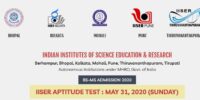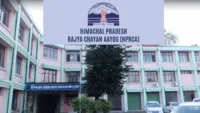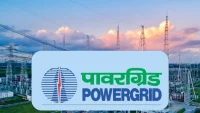Joint Entrance Screening Test (JEST) is conducted jointly by several premier research institutes in the country. JEST 2025 is conducted for admissions in PhD / Integrated PhD courses offered in courses such as Physics, Theoretical Computer Science, Neuroscience and Computational Biology. Science and Engineering Research Board (SERB) conducts this exam as a National Eligibility Test, once a year.
JEST 2025: Exam Overview
| Examination | JEST 2025 Entrance exam |
| Article Category | Admissions |
| Exam type | National level exam |
| Conducting Authority | The Science & Engineering Research Board (SERB) |
| Academic session | 2025-2026 |
| Course offered | Ph.D. / Integrated Ph.D. Program in Physics or Theoretical Computer Science or Neuroscience or Computational Biology |
| Date of JEST 2025 Examination | April 6, 2025 |
| Mode of examination | Online (Computer Based Test) |
| Official website | https://www.jest.org.in/joint-entrance-screening-test |
JEST 2025: Important Dates
| Events | Dates |
| Application process starts | |
| Last date to submit the application form | |
| Admit card availability | |
| JEST 2025 Exam Date | April 6, 2025 |
| Release of Answer Key | April 2025 |
| Last date for the objection against the answer key | 1st week of May 2025 |
| Result declaration | 4th week of May 2025 |
| Interview dates | 3rd week of June 2025 |
JEST 2025: Eligibility Criteria
- Please see the websites/advertisements of the participating institutes for their eligibility criteria in details.
- Listed below are tentative eligibility criteria of admission to M.Sc, Ph.D, and Integrated / M.Sc / M.Tech. – Ph.D programs in the participating institutes.
Ph.D. Programme
Physics
- M.Sc. in Physics (all participating Institutes).
Additionally, some institutes accept B.E. / B.Tech. / M.Sc. / M.E. / M.Tech. in disciplines of Applied Physics and Mathematics, as listed below.
- M.Sc. in Mathematics / Applied Physics / Applied Mathematics / Optics and Photonics / Instrumentation / Electronics will also be considered at IIA.
- B.E. or B.Tech. will be considered at IISc, IMSc, ICTS-TIFR, IUCAA, JNCASR, NCRA-TIFR, TIFR-TCIS, RRI, IISER Mohali, IISER Pune, IISER Thiruvananthapuram.
- M.Sc. in Physics / Electronics / Astronomy / Applied Mathematics will be cnsidered at IUCAA.
- MSc in Physics, Engineering Physics or Applied Physics will also be considered at IPR.
- M.Sc. in Physics, Chemistry, Applied Mathematics, Biophysics or Biochemistry will be considered at SNBNCBS.
- B.Tech Eng. Phys.will be considered at TIFR.
- M.E./ M.Tech in Applied Physics will be considered at NISER.
Theoretical Computer Science at IMSc
- M.Sc./ M.E. / M.Tech. in Computer Science and related disciplines, and should be interested in the mathematical aspects of computer science.
Ph D in Neuroscience at NBRC
- M.Sc (Physics/ Mathematics), B.E/ B.Tech/ M.C.A in Computer Science
Ph D in Computational Biology at IMSc
- M.Sc./ M.E. / M.Tech. / MCA in any engineering or science discipline, with good mathematical skills and strong interest in biological problems.
Integrated M.Sc. / M.Tech – Ph.D Programme (Physics)
- B. Sc. (Physics / Mathematics) will be considered at SNBNCBS.
- B. Sc. (Physics) will be considered at IMSc.
- B.Sc. (Physics / Mathematics) / B.E. / B.Tech. in Electrical / Instrumentation / Engineering Physics / Electronics and Communications / Computer Science and Engineering / Optics and Photonics will be considered in IIA.
- B.Sc (Physics) or B.E./B. Tech in Engineering Physics , with a minimum of first class marks, will be considered at NISER.
- B.Sc. (Physics) will be considered at IISER-Pune, ICTS-TIFR, NCRA-TIFR, and TIFR-TCIS.
- B. Sc. (Physics / Mathematics) / B.E. / B.Tec. will be considered for Integrated M.Sc – PhD at Bose Institute.
Integrated Ph.D Programme in Theoretical Computer Science at IMSc
- B.Sc./B.E./B.Tech./M.C.A. in Computer Science or related disciplines and should be interested in the mathematical aspects of computer science.
Integrated M.Tech – Ph.D. Programme at IIA
- M.Sc. (Physics / Applied Physics) / Post-B.Sc. (Hons) in Optics and Optoelectronics / Radio Physics and Electronics.
Integrated Ph.D. Programme at IISER IISER. Thiruvananthapuram.
- B. Sc. (Physics) or B.E. / B. Tech. in any discipline.
M. Sc. Programme at HRI.
- B. Sc. (Physics) or B.E./B.Tech. degree in any discipline
- HRI is starting a new M.Sc. programme in Physics from 2017. The Integrated Ph.D. programme in Physics at HRI is discontinued from 2017.
JEST 2025:Admission Process
JEST 2025: Application FEE
Rs. 400 (Rs 200 for SC/ST applicants, Rs.200/- for Female applicants) is required to be paid along with the application which can be paid online. No Application fee for Female applicants belonging to SC/ST.
How to Apply for JEST 2025
- Applications for JEST- 2025 can be submitted ON-LINE ONLY.
- Last date of ON-LINE submission of applications is December 14, 2019.
- Before filling the ON-LINE application form, candidate is requested to read the following instructions carefully.
ON-LINE Application
To apply online, applicants must create an account using a valid email-id. This account will remain valid from the time of account creation till one month after the date of declaration of results, for that year. Email-ids are linked to the created account as well as to the application, and will be used for all communications with the applicants. Therefore, the email-id should be active and must not be changed during this period. To submit application online, applicants must login to the created account and complete the application form. After submission, an unique submission number will be sent to your email-id. Please save all the emails sent to you and the unique submission number must be quoted by the applicant for any communication with the JEST authority.
The steps for submission of ON-LINE application form are
- Register yourself before you login. It is assumed that you already have an email-id.
- To register, the candidate has to click on the “Create new Account” link in the Homepage. You will receive an email with your account information after registering with a valid email-id. Follow the instructions given in the email for resetting your password and further login.
- Login to the JEST homepage with your username (your email-id) and password. Fill the form and save it, or, modify an already saved form. Press the “Submit Application” button ONLY when you have inserted and checked all the mandatory entries.
- Upload jpg files of your Passport size photo and scanned signature.
- Pay the application fee online using SBI Epay. Please check the FAQ for details of the payment process.
- After ON-LINE submission of the application form and successful e-payment of the application fee, your submission procedure will be considered complete. NO modification will be allowed after this.
E-Photo and E-Signature
Photo – Signature
- While filling up the form, you will be asked to upload jpeg files of your passport size photograph and your signature. The size of the individual files should not exceed 50 Kilo bytes. Crop out the extra white portion from the background surrounding the image to retain clarity.
- Before uploading your photo and signature files, make sure you have given it a good name. File names should use alphabets, underscores, and numbers only. Special characters such as spaces, (, #, &, punctuation, etc., should not be used in filenames. If you use a logical naming system, like loginname_date_photo.jpg, loginname_date_sig.jpg then it will be printed without any errors.
- In case the jpeg file of your photo which has been taken with camera exceeds the limit, you should compress the file size using compression softwares available in the websites, such as http://jpeg-optimizer.com, www.imageoptimizer.net.
- Your signature can be scanned with a digital scanner, and saved as jpeg file for uploading. In case this file size produced by scanner also exceeds 100 kB limit, you can compress it using the same tools as explained above.
- Please make sure the image type is jpeg. For checking, right click and go to the properties of the file being uploaded.
- Dimension of the image files should be the following
- Minimum of 100 X 125 pixels or maximum of 240 x 300 pixels (width x height) for photo and 150 x 30 pixels (width x height) for signature
- Please check ALL the properties of these image files before uploading.
Application Fee
- An Application Fee of Rs. 400 (Rs 200 for SC/ST, Female applicants ONLY) is required to be paid along with the application which can be paid online using Debit/Credit cards and Net-banking. Payment by any other mode will NOT be accepted. Please check the Available Payment Options and Transaction Charges
- Application Fee is waived for FEMALE applicants belonging to SC/ST. They need not pay the application fee.
- Please go through the refund policy (new tab) before paying the application fee.
- Payment of the fee will imply your agreement to the stated refund policies.
Post-Submission of Application form
- On successful submission of ON-LINE application form you will receive an E-mail with following information from JEST Website.
• Application data after final submission containing Unique Submission Number and filled in data.
- Please save this e-mail for further correspondence with the JEST authority.
- If you do not receive the above-mentioned e-mail after submission of application form and the successful e-payment of the application fee, contact JEST authority.
- Admit card will be available in the JEST webpage after 22nd of January, 2025. Bring a printout of the downloaded admit card and one of your photo-ids for entry into the examination centre. Admit cards will NOT be sent by post/email.
CLICK HERE to get an account.
CLICK HERE TO APPLY ONLINE.
JEST 2025 Exam Pattern
- The Exam will be conducted in Offline mode.
- The duration of the exam will be of 3 hours.
- The Question paper of Physics will be of three parts. I.e. Part A, Part B, Part C.
- The language of the paper will be English.
| Parts | No. of questions | Marking (+) | Negative Marking (-) |
| Part A | 15 | 3 | 1 |
| Part B | 10 | 3 | 0 |
| Part C | 25 | 1 | 1/3 |
Courses offered through JEST 2025
Ph.D / Integrated Ph.D Programme in Physics or Theoretical Computer Science or Neuroscience or Computational Biology
Participating Institutes
Visit the individual institute pages to view the programmes and subject areas being offered.
| ARIES | Aryabhatta Research Institute of Observational Sciences, Nainital: Astronomy and Astrophysics, and Atmospheric Physics. |
| Bose Institute | Bose Institute, Kolkata: Atmospheric sciences, Biophysics, Complex systems and networks, Condensed matter physics and materials science, High energy physics and astroparticle physics, Quantum physics and quantum information, Nuclear and radiation physics |
| HBNI | Homi Bhabha National Institute, Mumbai |
| HRI | Harish-Chandra Research Institute, Allahabad: Theoretical Physics, Astrophysics |
| ICTS | International centre for theoretical sciences (TIFR), Bangalore:Astrophysical Relativity, Data Assimilation and Dynamical Systems, Statistical Physics and Turbulence, and String theory and Quantum Gravity. |
| IGCAR | Indira Gandhi Centre for Atomic Research, Kalpakkam: Solid State Phase transformations, Superconductivity, Structure and dynamics of soft condensed matter, Band structure studies, Accelerators based Irradiation induced phenomena, Low-dimensional systems, Physics of interfaces, Nano-materials, Thin films technology and Theoretical physics |
| IIA | Indian Institute of Astrophysics, Bangalore: Astronomy and Astrophysics, Astronomical Instrumentation, Optics, and Atomic Physics. |
| IISc | Indian Institute of Science, Bangalore: Condensed Matter Physics (Experiments and Theory), Astronomy and Astrophysics (Theoretical), Atomic and Optical Physics (Experimental), Biocrystallography and Bio-informatics, and High Energy Physics (Theoretical). |
| IISER BHOPAL | Indian Institute of Science Education and Research Bhopal: Condensed Matter Physics (Theory and Experiment), Soft Matter Physics (Theory), Biophysics, Laser Plasma Interactions, Ultrafast Physics (Experiment), Astrophysics and Cosmology, High Energy Physics (Theory, Phenomenology and Experiment), Non-linear Optics |
| IISER KOLKATA | Indian Institute of Science Education and Research Kolkata: Condensed Matter Physics, Field Theory, Classical & Quantum Gravity, Cosmology, Solar Science, High Energy Physics, Non-linear dynamics, Statistical Physics, Soft Matter, Optics & Spectroscopy, Atomic physics, Biophotonics, Spintronics, Nanoscience, NMR, Quantum Information |
| IISER MOHALI | Indian Institute of Science Education and Research, Mohali: Quantum Theory, Quantum Information Processing, NMR-Methodology, Optics, Statistical Mechanics, Quantum Thermodynamics, Non-linear Dynamics, String Theory, Ultrafast Physics, and Low Temperature Mesoscopic Physics. |
| IISER PUNE | Indian Institute of Science Education and Research, Pune: Field Theory, Theoretical Particle Physics, Condensed Matter Physics, Non-linear Dynamics, Complex Systems and Networks, Nuclear Magnetic Resonance Spectroscopy, Quantum Information Processing, Radio Astrophysics, Atomic Physics and Quantum Optics, Energy Studies, Solar and Plasma Physics, Nanosciences, Scanning Probe Techniques, and Semiconductor Physics and Devices. |
| IISER THIRUVANANTHAPURAM | Indian Institute of Science Education and Research, Thiruvananthapuram: Experimental: Magnetism, Superconductivity, Nanoscience, Photonics, Semiconductor physics, Surface sciences, Nanoscale plasmonics, Ultrafast spectroscopy, Nonlinear Optics. Theory: Cosmology, Quantum information, Statistical physics, Condensed matter, String theory & Nonlinear dynamics. |
| IISER TIRUPATHI | Indian Institute of Science Education and Research, Tirupathi: Theoretical Astrophysics, Observational Astronomy, Theoretical Condensed Matter Physics, Soft Matter Physics, Nonlinear Physics, Experimental High Energy Physics, Atomic and Molecular Physics |
| IIST | Indian Institute of Space Science and Technology, Thiruvananthapuram: Astronomy and Astrophysics, Atmospheric Sciences, Applied and Adaptive Optics, Atomic and Molecular Physics, Condensed Matter Physics, Nanotechnology, Nonlinear Dynamics, Photonics, Quantum Information and Statistical Physics |
| IMSc | The Institute of Mathematical Sciences, Chennai: Theoretical Physics, Theoretical Computer Science, and Computational Biology |
| IOP | Institute of Physics, Bhubaneswar: Physics (Condensed Matter, Nuclear and High Energy Physics) and Accelerator-based Research. |
| IPR | Institute for Plasma Research, Gandhinagar: Physics (Experimental and Theoretical). |
| IUCAA | Inter-University Centre for Astronomy and Astrophysics, Pune: Physics, Astronomy and Astrophysics. |
| JNCASR | Jawaharlal Nehru Centre for Advanced Scientific Research, Bangalore: Experimental and Theoretical Condensed Matter Physics, Statistical Mechanics, and Materials Science. |
| NBRC | National Brain Research Centre, Manesar:Molecular, Computaional and Systems Neuroscience. Sensory & motor systems, learning & memory, language & speech processing, functional neuroimaging: EEG, MEG, fMRI, MRS, stem cells, developmental neurobiology, neurogenetics, neurodegenerative and neurodevelopmental disorders, cancer signaling & glial tumor biology. |
| NCRA-TIFR | National Centre for Radio Astrophysics, TIFR, Pune: Astronomy and Astrophysics. |
| NISER | National Institute of Science Education and Research, Bhubaneswar: Theoretical High Energy Physics and Lattice QCD, Experimental High Energy Physics, Condensed Matter Physics (Theory and Experiment), Optics and Metamaterials. |
| PRL | Physical Research Laboratory, Ahmedabad: Theoretical Physics, Astronomy and Astrophysics, Solar Physics, Space and Atmospheric Sciences, Planetary Science and Geo-Sciences. |
| RRCAT | Raja Ramanna Centre for Advanced Technology, Indore: Lasers and their Applications, Laser Plasma Interaction, Cold Atom Physics, Condensed Matter Physics (Superconductivity and Magnetism, Crystals and Thin Films), Nanomaterials and Applications, Non-linear and Ultrafast Optical Studies, Beam Physics, and Free Electron Laser. |
| RRI | Raman Research Institute, Bangalore: Astronomy and Astrophysics, Light and Matter Physics, Soft Condensed Matter Physics (Liquid Crystals, Physics in Biology), and Theoretical Physics. |
| SINP | Saha Institute of Nuclear Physics, Kolkata: Condensed Matter Physics (Theory and Experiments), Nuclear Physics (Theory and Experiments), High Energy Physics (Theory and Experiments), Astroparticle Physics, Quantum Gravity, String Theory, Mathematical Physics, and Materials Science (Surface Science and Plasma Physics). |
| SNBNCBS | Satyendra Nath Bose National Centre for Basic Sciences, Kolkata: Astrophysics and Cosmology, Chemical and Biological Physics, Condensed Matter Physics and Material Science, High Energy Physics and Quantum Field Theory, Mathematical Physics, Nanosciences, Quantum Optics and Quantum Information, Statistical Physics, and Complex Systems. |
| TIFR-TCIS | TIFR Centre for Interdisciplinary Sciences, Hyderabad: Condensed Matter Physics & Materials Science of Nonequilibrium, Soft & Living matter, Fluid Dynamics, Intense Laser-matter interactions, Computational Physics, Statistical physics, NMR of Biophysical & other systems |
| TIFR | Tata Institute of Fundamental Research, Mumbai: Astronomy and Astrophysics, Condensed Matter Physics and Material Science, High Energy Physics, Nuclear and Atomic Physics, Theoretical Physics |
| UGC-DAE CSR | UGC-DAE Consortium for Scientific Research, Indore: Surfaces, Interfaces, Thin Films and Nanomaterials, Physics at Low Temperatures and High Magnetic Fields, X-ray, Optical and Electron Spectroscopic Studies Using Synchrotron and Laboratory Sources; Electrical, Magnetic and Thermal Properties of Condensed Matter; Condensed Matter studies using Magnetic Neutron Diffraction, Nuclear Technique Based Condensed Matter Physics-Positron Annihilation Spectroscopy, Mossbauer Spectroscopy, Experimental Nuclear Physics, Gamma Ray Spectroscopy of Nuclear High Spin States, and Nuclear Reactions. |
| VECC | Variable Energy Cyclotron Centre, Kolkata: Accelerator Physics, Condensed Matter Physics and Materials Science, Nuclear Physics (Experiments and Theory), Relativistic Heavy Ion Collisions (Experiments, Theory, QCD and QGP), and Physics of Neutrinos (Experiments). |
JEST 2025: Admit Card
The Admit card of JEST 2025 will be published after the completion of application process. It is a necessary document which will mention certain important details about the appearing candidate and the exam. In case any discrepancy arises in the details of the admit card or during downloading the admit card, students must contact the officials immediately.
JEST 2025 Exam Centres
JEST will be held at the locations indicated below.
- Ahmedabad
- Aligarh
- Allahabad
- Amritsar
- Bangalore
- Bardhaman
- Bhopal
- Bhubaneswar
- Kozhikode
- Chandigarh
- Chennai
- Delhi
- Goa
- Guwhati
- Hyderabad
- Indore
- Jaipur
- Kanpur
- Kharagpur
- Kochi
- Kolkata
- Madurai
- Mangalore
- Mumbai
- Nagpur
- Nainital
- Patna
- Pune
- Raipur
- Roorkee
- Sambalpur
- Silchar
- Siliguri
- Srinagar
- Trivandrum
- Udaipur
- Vishakhapatnam
JEST 2025: Result
The Result of JEST 2025 will be released after the General ability test, creative ability test and interview. The result will be published by online mode. To check the result online and download the scorecard, students have to enter their application number, roll number and date of birth.
The result of the entrance examination shall be announced on the official website of SERB.
Important Links for JEST 2025
| Official Website | Click Here |
| Notification | Click Here |
| Application | Click Here |









